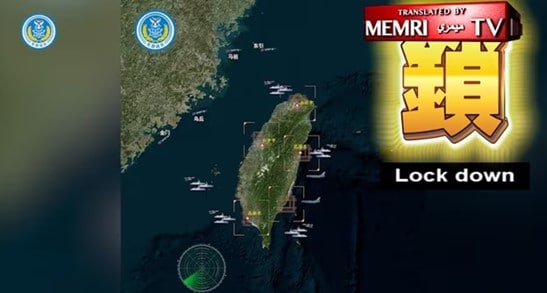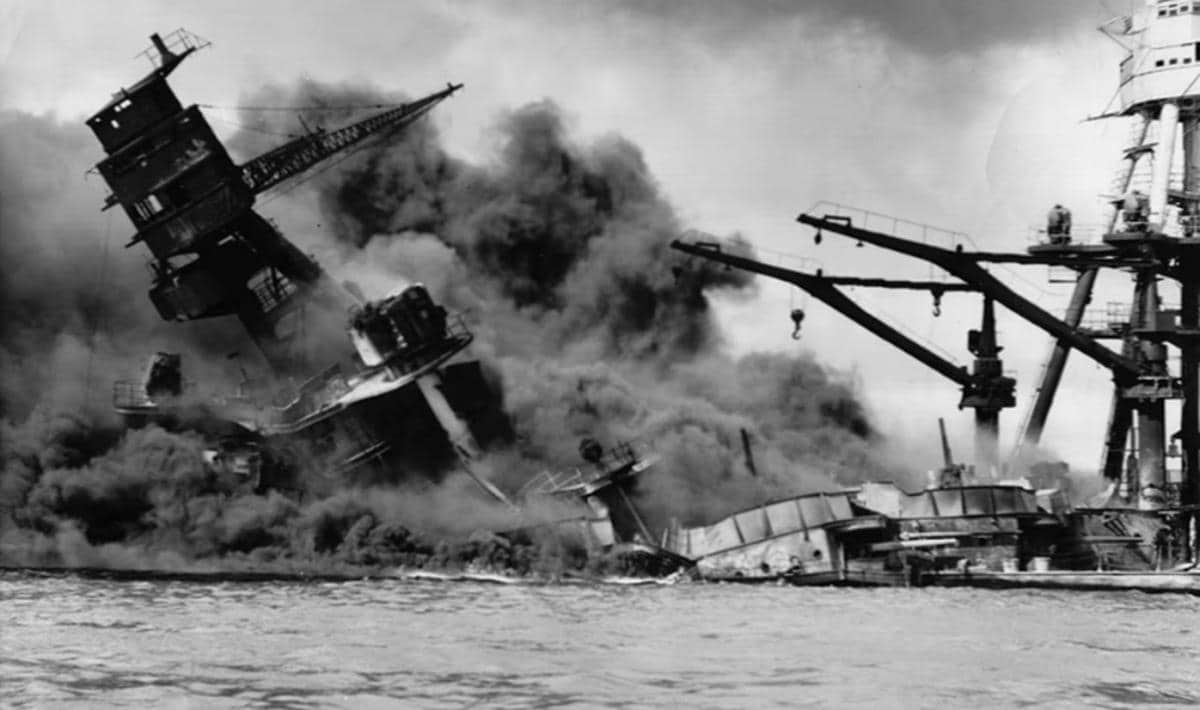Introduction
Senior Chinese figures, from Xi Jinping down through Chinese Communist Party (CCP) leaders and People's Liberation Army (PLA) commanders, have been reiterating for years that Taiwan must be "reunited with the mainland," and that this will happen, whether by peaceful means or by way of military action.
China has been openly carrying out military drills simulating an invasion of Taiwan. Following the inaugural speech of Taiwanese President Lai Ching-te, in which Taiwan's sovereignty was asserted, the PLA launched in the morning of May 23, 2024, a two-day massive military exercise code-named Joint Sword-2024A, surrounding the island of Taiwan (to the north, south and east of Taiwan, as well as areas around the islands of Kinmen, Matsu, Wuqiu, and Dongyin, which are located in the Taiwan Strait), simulating an attack on the island with Naval warships, fighter jets bombers, helicopters, and rocket launch systems.[1]
Compared to the 2022 previous drills, the Joint Sword-2024A covered wider regions and the drill's encirclement on the main island of Taiwan became tighter, with the goal of normalizing the PLA's presence in the area in case of an actual invasion of the island.
It is worth noting that China is also very confident about its ability to stand up to the U.S. and its allies in the Pacific, as is evident in the way that Chinese experts describe the balance of power between China and the U.S.
In light of these consistent threats, provocations, and preparations, could a Chinese surprise attack still be possible?


See MEMRI TV Clip No. 11162, Chinese PLA Eastern Command Publishes Video Outlining Motto For Quashing Taiwanese Independence: Advance, Besiege, Lock Down, Attack, Destroy, Cut Off, May 25, 2024
What Constitutes A Surprise: The Example Of The 1973 Egyptian-Syrian Attack On Israel
Israel's experience in the October 1973 war reveals that even when there are ongoing threats and provocations, including limited war (such as the 1967-1970 War of Attrition), an attack can still come as a surprise, as it also showed the October 7 attack in Israel's territory.
In the years before the war, the Egyptian leadership had made it clear in diplomatic messages and political declarations that it wanted to attack Israeli forces in the Sinai Peninsula and reunite Sinai with Egypt. The Israeli government and its intelligence agencies were aware of this.
Egypt also made obvious military preparations. In the period leading up to the invasion of the Sinai Peninsula, which was planned for launch during the Islamic month of Ramadhan in conjunction with a Syrian invasion of the Golan Heights, the Egyptian military carried out 20 military drills simulating a crossing of the Suez Canal. In a foreshadowing of the planned attack, these drills were codenamed "Badr" after the historic Battle of Badr, which took place in Ramadhan of 632 C.E. between Muhammad's companions and the tribe of Quraish. Meanwhile, Syria also carried out military drills in preparation for the joint invasion of Israel.
Knowledge of Egypt's intentions and preparations did not prompt the Israelis to assess that an invasion was imminent. On the contrary: The Israelis believed that the only military goal of these drills was to pressure and threaten Israel. The Israelis assumed that the goal of an Egyptian invasion would be to reoccupy the entire Sinai Peninsula. Since both sides felt that this goal was unattainable due to the strength of Israel's military, the Israelis concluded that an Egyptian invasion was impossible. Israel did not entertain the possibility of an invasion with a limited goal, such as crossing the Suez Canal and advancing only halfway into the Sinai Peninsula – something that was within the capabilities of the Egyptian military.
In addition, Israel was confident that its air superiority would render any Egyptian attack futile, and Egypt's poor performance in the June 1967 war was further reason to downplay the likelihood of an attack.
Israel interpreted Egypt's threats, provocations, and military drills as propaganda aimed at the Egyptian public and the Arab world and at the same time at pressuring Israel to enter into negotiations to withdraw from the Sinai Peninsula.
Because it completely overlooked the possibility of a small-scale invasion, Israel did not use emergency assets that could have provided it with valuable intelligence about the upcoming attack. That is, the necessary strategic intelligence could have been available to Israel, but it was too confident about its assessments to use these assets.
In addition, though one Egyptian source did provide Israel with intelligence about the upcoming attack early enough to allow Israel's air force to carry out a pre-emptive strike, Prime Minister Golda Meir decided against such a strike. She felt that if the report turned out to be mistaken, an Israeli attack on Egypt would be entirely unjustified and would seriously harm Israel's standing.
Critically, Israel grossly underestimated Egypt's ideological conviction that reconquering Sinai was absolutely imperative.
At the time, I was serving as a junior officer in the IDF's Intelligence Corps. Upon receiving early-morning reports that the Syrians were clearing minefields they themselves had planted to prevent an Israeli invasion, a senior commander of mine said the unforgettable words: "Look at those silly Syrians. For a drill, they are actually removing the mines!" That's how successful Egypt and Syria were in deceiving Israel.
Egypt had held 20 Badr drills without incident. Thus, the Israelis were caught completely off guard when Egypt's 21st Badr "drill" turned out to be a real invasion of the Sinai Peninsula. On the morning of the Jewish holiday of Yom Kippur, which coincided that year with Ramadhan, Egyptian forces crossed the Suez Canal into Israel-held territory. Simultaneously, Syrian forces invaded the Golan Heights.
Israel's experience in 1973 proves that political statements and military provocations may be misinterpreted, regardless of how clear and public they are, to mean something other than what they truly convey. A surprise attack is possible even when there are clear indications that an attack is imminent.

Egyptian forces crossing into the Suez Canal on October 7, 1973 (Source: CIA public domain image)
Pearl Harbor – Another Chronicle Of A Surprise Attack Foretold
A similar lesson can be learned by analyzing the surprise Japanese attack on Pearl Harbor.
In light of World War II and the Sino-Japanese War, the U.S. had plenty of reasons to assess that Japan might strike American targets, and American planners had been aware of Japan's naval buildup in the period prior to the attack.
The Americans also knew that Pearl Harbor was one of their most vulnerable assets in the Pacific – American forces in Hawaii were even given budgetary priority over other Pacific assets. U.S. Pacific Fleet Commander Admiral Husband Kimmel, who would months later watch helplessly as the Japanese assaulted Pearl Harbor, had said in February 1941 that an attack on the strategic naval outpost was a possibility. Indeed, many of the ships sunk at Pearl Harbor had been brought to Hawaii as a deterrent to Japanese expansion in Asia.
But even when America's top leadership, including President Roosevelt himself, had strong indications that a Japanese attack was imminent, the information was not acted upon – and no pre-emptive action was taken – out of concerns about alarming the population and provoking the Japanese.
As a result, even though the Americans had all the indications and evidence necessary and presumed that Japan would attack U.S. targets in the Pacific at some point, the air assault on Pearl Harbor came as a total surprise in terms of its magnitude and in terms of Japan's boldness and creativity.

A U.S. battleship sinking during the Pearl Harbor attack. (Source: National Archives, Washington, D.C.)
Conclusion
This article tries to assert that if China does decide to take aggressive military action to occupy Taiwan, such an attack could still come as a surprise to the West, even though there is sufficient information about China's intentions and capabilities.
It may be that any Western assessment, if there is one, about the unlikelihood of a Chinese attack is guided by the assumption that the economic consequences for China would be crippling enough to deter Xi from attacking Taiwan.
What does not seem to be a sufficient deterrent against China is America's current military capabilities. China's naval industrial output surpasses that of America and its allies, and the tyranny of distance limits the United States' capability to swiftly respond to a Chinese invasion of Taiwan.
In the cases of Pearl Harbor and the Sinai Peninsula, military deterrence also proved to be insufficient. Egypt took the strategic risk of invading Sinai, even though it was not vital for Egypt's existence. Similarly, Japan took the strategic risk of attacking Pearl Harbor, even though destroying the American fleet was not vital for Japan's military plans.
Hence, basing a strategic assessment on the question of whether a territory or a single military target is vital enough to justify risking crippling consequences proved to be a mistake in 1941 and in 1973, and may prove again to be a mistake in the case of China and Taiwan.
Furthermore, any anticipated economic retaliation for invading Taiwan may ultimately prove to be less meaningful and less intimidating for China than expected. It remains unclear whether the threat of economic retaliation is a strong enough deterrent. In 1989, when Deng Xiaoping faced the risk of economic sanctions if he were to use the PLA to repress the Tiananmen protests, Deng nevertheless did so. Deng risked China's economy, which was the cornerstone of his endeavor as China's leader, and survived.
As happened in 1941 and 1973, the ideological imperative behind reunifying Taiwan with the Chinese mainland may override the risk of consequences for China, which ultimately may even be minimal, and a Chinese invasion of Taiwan may become another infamous historical surprise attack.
* Y. Carmon is President of MEMRI; M. Reiter is a Research Fellow at MEMRI.
[1] See MEMRI Special Dispatch No. 11375, All Eyes On Taiwan, June 4, 2024





